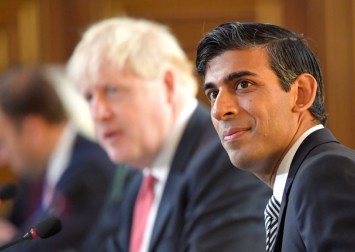The first real test for Sunak: Rees-Mogg and the Brexit bill
By Brian Wilson https://www.heraldscotland.com/
AS the Tories struggled towards the latest least-worst option, the good news was that Boris Johnson had retreated in abject humiliation – the prince across the water who would have done better to stay where he was, on a Dominican beach.
The less promising assumption is that to get rid of him, Rishi Sunak has done deals with Johnson’s right-wing, ultra-Brexiter backers. The facts he can count and is not Liz Truss should not disguise Mr Sunak’s wider politics which are far from liberal, as his Cabinet line-up will surely confirm.
There is an early test of whether either sense or moderation have entered Downing Street along with its latest occupant. It comes in the form of the Retained EU Law (Revocation and Reform) Bill which has its second reading in the House of Commons today.
This may not sound the most attention-seeking piece of legislation but its potential implications, both practical and ideological, are profound. In summary, it is about the extent to which Brexit will be used to sweep away regulations which carry the historic stamp of EU membership, regardless of their merits.
There are real fears that powers conferred by the bill could be used to get rid of workers’ rights, environmental protections and public health measures with minimal debate in order to meet an artificial deadline which has been set for the end of next year. All in order to claim a “Brexit dividend”.
These questions have been pretty much on hold for the past four years since Theresa May, of relatively blessed memory, decided it prudent not to rush things. So EU-originated regulations were “retained” on the statute books of both the UK and its devolved administrations.
Given the reality of Brexit, there is a rational argument for gradually translating these measures, numbering more than 2,400, into UK law or, in devolved policy areas, into Scottish law. Those of us who never regarded the EU as a font of perfection would expect there to be opportunities for improvement as well as obvious dangers.
It all depends whose hands the conversion process is in – and that is where the immediate concern lies. Eleanor Duhs, a lawyer who helped draft Mrs May’s approach describes the current bill as “unprecedented, reckless and undemocratic” and completely at odds with her commitment to gradual, considered transition.
This drive for rapid, wholesale conversion or abolition began under Johnson and his then crony, Lord Frost, who was put in charge of something called the Brexit Opportunities Unit and the new approach emerged last year as fodder for the Brexit hard-liners. The end of 2023 was set as the “sunset” date for most EU regulations.
Since then, the pace has quickened. A House of Commons briefing paper states: “The current bill goes considerably further than was indicated in the December 2021 ministerial statement. It completely overhauls the constitutional architecture … making it much easier to revoke, modify or replace through secondary legislation.”
In other words, any existing regulation that Tory ministers dislike can be wiped out without Parliamentary scrutiny or room for opposition. At the time of writing, the Secretary of State in charge of this process is Jacob Rees-Mogg, who slithers from one administration to the next, personifying the worst traits of privileged, arrogant right to rule.
He also leads the “Brexit whatever the consequences” camp which regards abolishing EU-inspired regulations as an end in itself. This ideological zeal is now driving intense concerns among trade unions, environmental, animal welfare and consumer bodies, to mention but a few.
Their fears are well justified. As things stand, an ideological broad brush could sweep away many decent, necessary advances which have been built during our membership of the EU. The more time runs out on them, the more desperate the likes of Rees-Mogg are to complete this version of a “Brexit dividend”.
This is where Sunak comes in. If he presses ahead with this red meat for the Brexiters approach and leaves Rees-Mogg to administer it, then all the talk about bringing either party or country together will be complete hogwash. Reverting to Mrs May’s approach would send a different signal – and she was, after all, a Tory Prime Minister.
Neither is there any need for another tiresome debate about “power grabs” between Westminster and Holyrood. Where these regulations are within devolved areas of competence, there should be no doubt about responsibility continuing to rest in Edinburgh or Cardiff. That is something Sunak could confirm very quickly.
A debate on this at Westminster seemed to focus disproportionately on the case study of chlorinated chicken. If the Tories lift the EU ban, will Scotland’s power to bar it from our supermarkets be grabbed away? A minister replied to that specific question: “If the Scottish Government want to preserve legislation within their competency, the UK Government will respect it. I think there is clarity on that”.
That does seem clear-cut but needs confirming. If we don’t want chlorinated chicken, nobody will force-feed us it. By extension, there is no “power grab” and Holyrood will control these regulations within devolved policy areas. That still leaves us with the same alarms that are sounding throughout the UK in response to the real dangers this bill entails. Let’s not be distracted.
At the heart of this is the wider question of relations with the EU. The only way to achieve a positive, constructive approach which is not only common sense but essential to economic growth is through a change of government.
That does not required Brexit to be reversed and an incoming Labour government would be crazy to get bogged down in that argument which would inevitably require another referendum
If we were freed of the ultra-Brexit mentality, it would be perfectly possible to re-shape the relationship in a constructive way, to all-round benefit.
On his first day in office, the test for Mr Sunak is whether he will defer to the legitimate concerns this bill has provoked – or if he will leave Rees-Mogg to pursue an ideological agenda, in the discredited name of Brexit. If that happens, then nothing will have changed.














